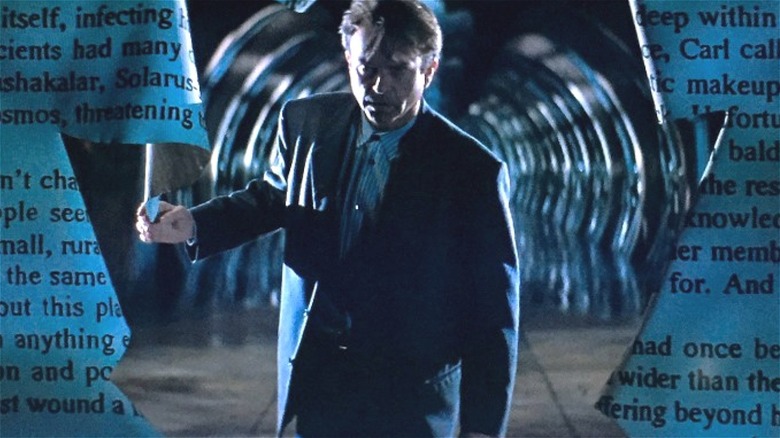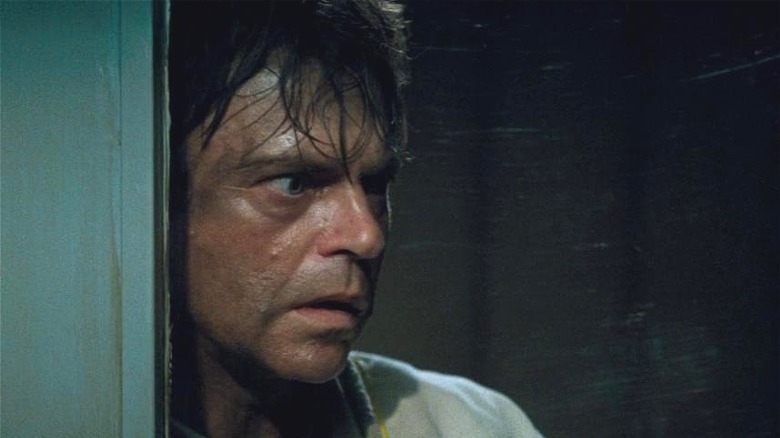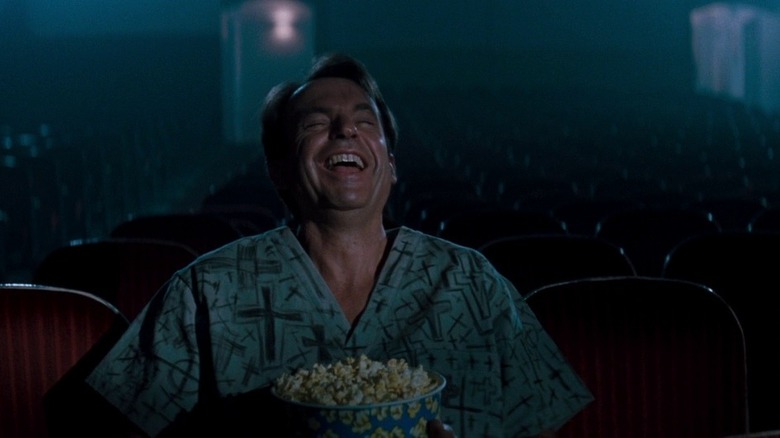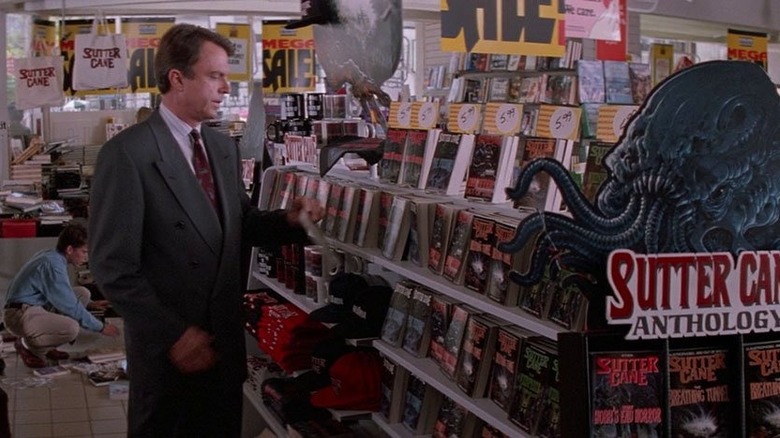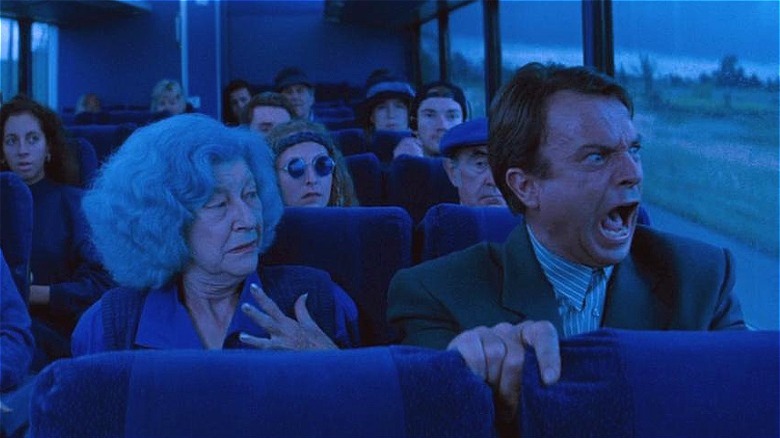The Daily Stream: In The Mouth Of Madness Is An Overlooked Cosmic Gem
(Welcome to The Daily Stream, an ongoing series in which the /Film team shares what they've been watching, why it's worth checking out, and where you can stream it.)
The Movie: "In the Mouth of Madness"
Where You Can Stream It: Prime Video
The Pitch: John Carpenter's "In the Mouth of Madness" is an overlooked cosmic horror gem. Diving into the depths of Lovecraftian mythos and offering prescient commentary of the artistic process in relation to obsessive fan culture, Carpenter paints a bleak, engrossing picture of how insanity can be contagious.
The film opens with insurance fraud agent John Trent (Sam Neill) being held in a padded cell while an "insanity plague" grips the masses, leading to violence and absolute mayhem in the streets. Recounting his tale to an investigative doctor (David Warner), Trent explains that the beginning of the end can be traced back to popular horror writer Sutter Cane (Jürgen Prochnow), whose disappearance spurred him to investigate his whereabouts with Cane's editor Linda Styles (Julie Carmen).
While Trent starts out believing that Cane's disappearance is simply a publicity stunt to drive sales for his upcoming book, "In the Mouth of Madness" (heh), the skeptical insurance agent is soon pushed to the edge of sanity when he realizes that Cane's fiction has merged with reality, leading to a string of events that makes him question his own existence. The way the events play out in Carpenter's film is pure nightmare fuel, as it questions our perception of reality, and the thin line that separates the "sane" and "insane."
Why it's essential viewing
"In the Mouth of Madness" is a special horror offering, as it functions on an extremely meta-level. The film is about a work of fiction coming to life, then being turned into a film, which is the very film we are watching. Trent's character is an obvious audience stand-in — he's skeptical of the uncanny events from the start, always trying to decipher everything around him through the lens of practicality, to the point that he remains oblivious to his surroundings until it is a little too late.
Interestingly, the film is the final entry in Carpenter's unofficial "Apocalypse" trilogy (the other two entries being "Prince of Darkness" and "The Thing"), ending on a rather grim note of the world being gripped by the insanity plague, ushering the end of humanity.
The power of belief
Like Trent, we want to be in control of our own reality, and remain sane even in the face of unexplainable horrors. The revelation that Trent might be a figment of an author's imagination breaks him, and this is supposed to act as a source of discomfort for the audience (naturally, the very thought is terrifying). Moreover, the reason why Cane's vision becomes a reality is that the readers grant it the power to become so — in a pivotal scene, Linda explains to Trent that fiction is like religion, assuming a life of its own when enough people devour it and dedicate themselves to it. As reality is a human construct that is ever-changing, what's real and what's not is difficult to gauge, as evidenced by Linda and Trent's trip to Hobb's End, which used to be a fictional town in Cane's works, now come to life in all its descriptive grotesqueness.
Every scene in Hobb's End is straight out of an especially unhinged fever dream: zombie children call Linda their "mommy," asking her to play with them, a seemingly-harmless old lady turns out to be a tentacled monster, and Cane himself resides within a menacing ancient church, working at a typewriter inside a room made of sentient, throbbing flesh. Pure madness.
Toxic fan culture
Cane's influence as a celebrity author is likened to be greater than Stephen King's, to the point that his loyal readers cause riots in the streets when their favorite books are sold out in the store. There's also a Lovecraftian element shaping this whole hive-mind phenomenon, as the "Old Ones" from the Cthulhu mythos play an integral part in the storyline, helping Cane create a fictional world so convincing and infectious that it triggers an epidemic along his loyalists, which spreads far and wide.
During their car ride to Hobb's End, Linda tells Trent that "sane and insane could easily switch places if the insane were to become the majority." This is truly the crux of the film, doubling as a foreshadowing of Trent's eventual fate while foreshadowing the current culture of toxic fanbases invading social forums over their obsession with intellectual properties. Whether Carpenter truly saw this coming or not is unclear, but this narrative strand makes the film endlessly relevant, especially now.
Reality is not what it used to be
This also poses the question: while shared fictional realities offer much-needed escapism, what happens when we are unable to distinguish them from the events of the external world? Or worse, what even is reality, within the context of our painfully-limited human comprehension? Even Trent's recollection of events, which is his iteration of reality, is peppered with false starts, trippy visuals, and hallucinations, making us question whether he is a reliable narrator at all.
Needless to say, Neill delivers an unforgettable performance as Trent, making the character's trajectory into madness (or sanity, depending on how you view it) extremely believable. One of my favorite things about the film is a blink-and-you-miss-it cameo by a young Hayden Christensen, so keep your eyes peeled for that. Apart from this, "In the Mouth of Madness" features a complex villain, as Cane's urge to merge reality with fiction stems from reasons that are both human and supernatural, and in the process of doing so, he holds up a mirror to society. The revelations are unpleasant, to say the very least.
